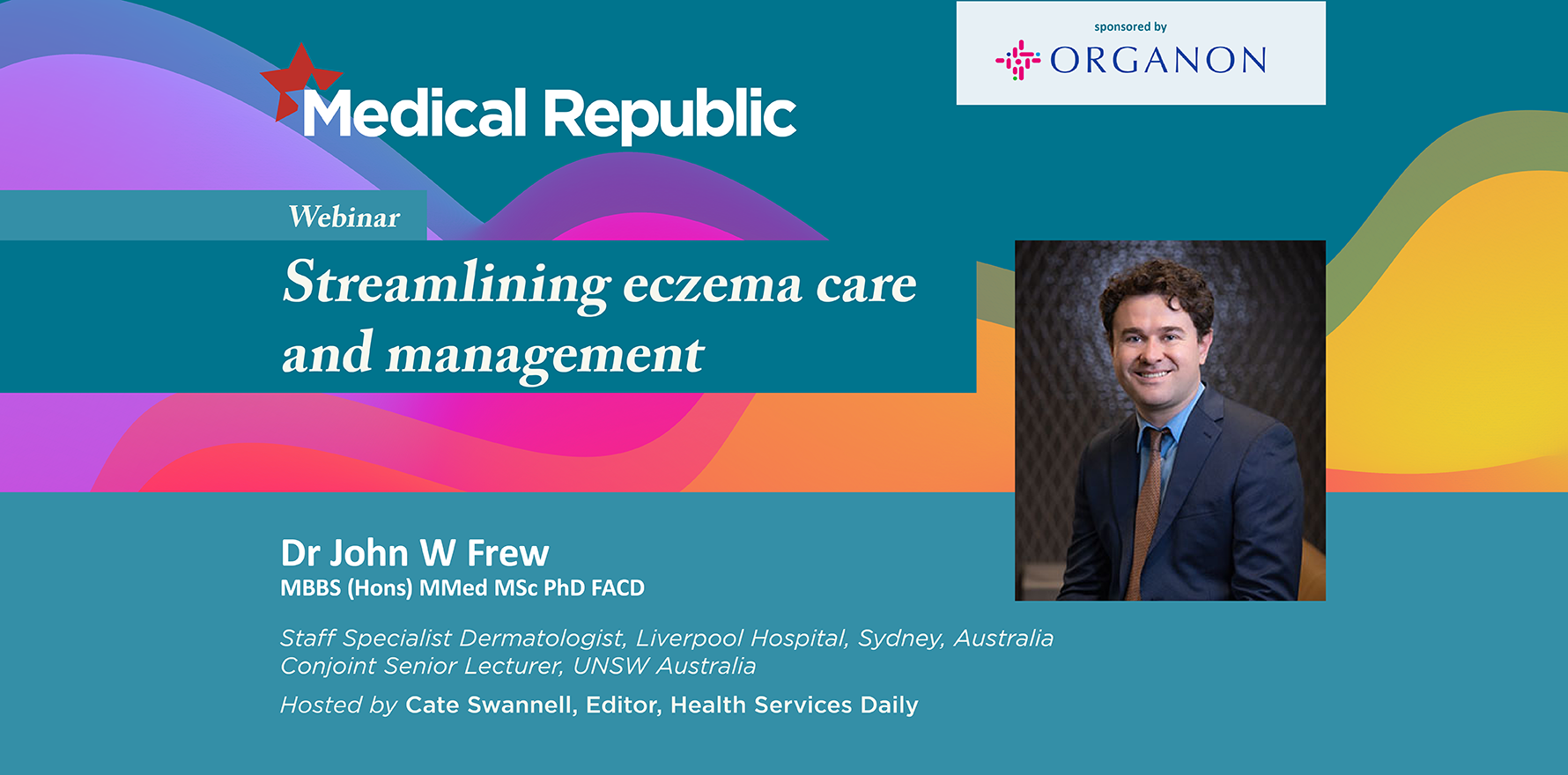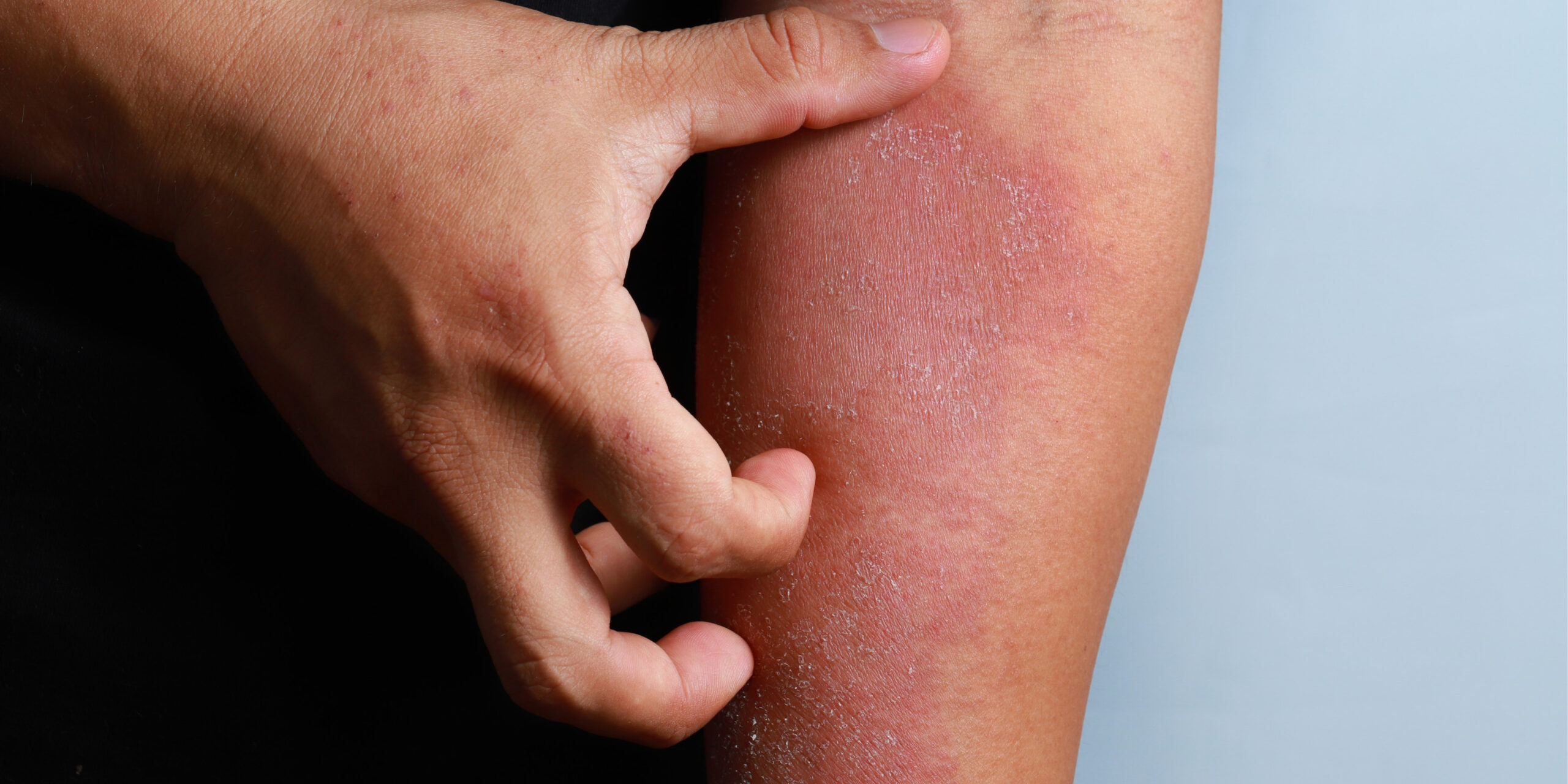Got a question about managing eczema? Our expert shares his advice for optimising treatment in general practice.
Guidelines recommend an aggressive approach to the topical treatment of eczema – treating all areas of inflammation until the skin is completely clear (1) – yet some GPs remain hesitant in their approach. (2,3)
Whether this reflects a lack of confidence in potent treatments for severe eczema or concerns over the safety of topical treatments, this hesitancy can lead to undertreatment. (4)
Undertreatment of eczema – specifically the underuse of topical corticosteroids (TCSs) – has been shown to be the most common cause of treatment failure. (1,4) In fact, undertreatment is more widespread than overtreatment, highlighting a need to address misconceptions and misunderstandings in the appropriate management of eczema. (5,6)
Sydney dermatologist Dr John Frew said about 16% of the population was estimated to suffer from the effects of atopic eczema, (7) although that figure could be an underestimate due to the challenges involved in accurately measuring disease prevalence. (7,8)
“Certainly, it’s the most prevalent inflammatory skin disease that we know of,” he said. (9)
According to Dr Frew, raised awareness of eczema has led to an increase in people presenting to GPs and specialists, looking for ways to treat their condition.*
“I think the morbidity and impact of atopic dermatitis is very understated,” he said. (10,11)
“Certainly, a whole lot of people go their whole lives just accepting that it’s normal to be itchy, it’s normal not to sleep through the night, it’s normal to be scratching yourself until you bleed.”
“This is something that does affect people’s education, (11) their concentration at school, (7,10) particularly for children, (10,11) their ability to work. (7,12)
“So, it definitely has a very severe impact on the most severely affected individuals, but it can have an insidious, low-grade chronic impact on many people who suffer from moderate disease.” (12,13)
The use of topical corticosteroids is the cornerstone of treatment for patients of all ages and severity of disease. (1)
“For many, many years, the biggest challenge to patients with eczema was a lack of options,” said Dr Frew.
“We’re lucky now we have very good, very useful, very effective topical treatments for dermatitis and certainly we have a variety of systemic treatments which are much safer and more effective than previously used [systemic] therapies† for very severe dermatitis.” (14)
(†Such as traditional immunosuppressive therapies such as azathioprine, methotrexate and ciclosporin)
Join us for a discussion between dermatologist Dr. Frew and GP and Cate Swannell, Editor of Health Services Daily and a senior journalist with The Medical Republic.
Dr Frew answers questions about the use of topical corticosteroids, and addresses some of the myths around eczema, including the theory that children will outgrow the disease.
Duration: 25 Minutes
Dr John Frew MBBS MMed MS PhD FACD
Dr Frew is a dermatologist and dermatological researcher at The Ingham Institute for Applied Medical Research at the University of New South Wales (UNSW) in Sydney, Australia. After graduating with honors from UNSW, he obtained a Master of Medicine from the University of Sydney and a PhD at Flinders University. After completion his dermatology specialist training in 2016, Dr Frew undertook translational research at The Rockefeller University in New York City, investigating the inflammatory mechanisms in Hidradenitis Suppurativa. He currently holds a clinical appointment at Liverpool Hospital in Sydney and is Head of the Laboratory of Translational Cutaneous Medicine at the Ingham Institute for Applied Medical Research. Dr Frew has authored more than 130 peer-reviewed articles and has a special interest in the pathogenesis and molecular mechanisms in Hidradenitis Suppurativa and other inflammatory dermatoses.
Host: Cate Swannell is the editor of Health Services Daily and a senior journalist with The Medical Republic. She has been a journalist for 35 years, 11 of those as a medical journalist and editor, including a decade with the Medical Journal of Australia as the editor of MJA InSight+.
*Opinion of Dr Frew
References:
1. Atopic dermatitis [Published November 2015. Amended March 2021.] ©Therapeutic Guidelines Ltd (eTG March 2021 edition). Available at: https://www.tg.org.au [Accessed March 2024].
2. Australasian College of Dermatologists. Consensus Statement: Topical corticosteroids in paediatric eczema. Endorsed September 2022. Available at: https://www.dermcoll.edu.au/wp-content/uploads/2022/09/ACD-Consensus-Statement-Topical-Corticosteroids-September-2022-.pdf [Accessed March 2024].
3. Rübsam ML, Esch M, Baum E, Bösner S. Diagnosing skin disease in primary care: a qualitative study of GPs’ approaches. Fam Pract 2015; 32(5):591-5.
4. Le Roux E et al. GPs’ experiences of diagnosing and managing childhood eczema: a qualitative study in primary care Br J Gen Pract 2018:e73–e80.
5. Aung T, Aung ST. Selection of an effective topical corticosteroid AJCP 2021; 50(9):651–55.
6. Eichenfield LF et al. Guidelines of care for the management of atopic dermatitis Part 2: Management and treatment of atopic dermatitis with topical Therapies J Am Acad Dermatol 2014; 71(1):116–32.
7. Chidwick K et al. Prevalence, incidence and management of atopic dermatitis in Australian general practice using routinely collected data from MedicineInsight. Australas J Dermatol 2020;61:e319–e327.
8. Zeleke BM, et al. Epidemiology of eczema in South-Eastern Australia Australas J Dermatol 2023; 64:e41-e50.
9. Eczema Support Australia. 5 Burdens of Eczema that impact all aspects of life. Available at: https://www.eczemasupport.org.au/5-burdens-of-eczema-that-impacts-all-aspects-of-life/#:~:text=Burden%20of%20Extreme%20Itch%20and,wounds%20from%20the%20uncontrollable%20scratching. [Accessed September 2023].
10. Na CH et al. Quality of Life and Disease Impact of Atopic Dermatitis and Psoriasis on Children and Their Families. Children (Basel) 2019; 6(12):133.
11. Kelly KA et al. Skin Disease in Children: Effects on Quality of Life, Stigmatization, Bullying, and Suicide Risk in Pediatric Acne, Atopic Dermatitis, and Psoriasis Patients. Children (Basel) 2021; 8(11):1057.
12. Lax SJ et al. Strategies for using topical corticosteroids in children and adults with eczema. Cochrane Database Syst Rev. 2022; 3:CD013356.
13. Eckert L et al. Impact of atopic dermatitis on health-related quality of life and productivity in adults in the United States: An analysis using the National Health and Wellness Survey J Am Acad Dermatol 2017; 77(1):274-279.
14. Goh MSY et al. Management of atopic dermatitis: a narrative review MJA 2022; 216(11):587–93.

© 2024 Organon group of companies. All rights reserved. ORGANON and the ORGANON Logo are trade marks of the Organon group of companies. Organon Pharma Pty Ltd (Organon), Building A, Level 3, 26 Talavera Rd, Macquarie Park NSW 2113 Australia. AU-XDI-110100. Issued March 2024.
Before prescribing, please review the Product Information. The Product Information is available upon request from Organon or can be accessed at www.organoninfo.com.au/diprosonepi and www.organoninfo.com.au/diprosoneOVpi
Authority Required (STREAMLINED) for increased packs and repeats.
DIPROSONE 30mL lotion and 50g cream or ointment are not listed on the PBS.
DIPROSONE OV is not listed on the PBS.





